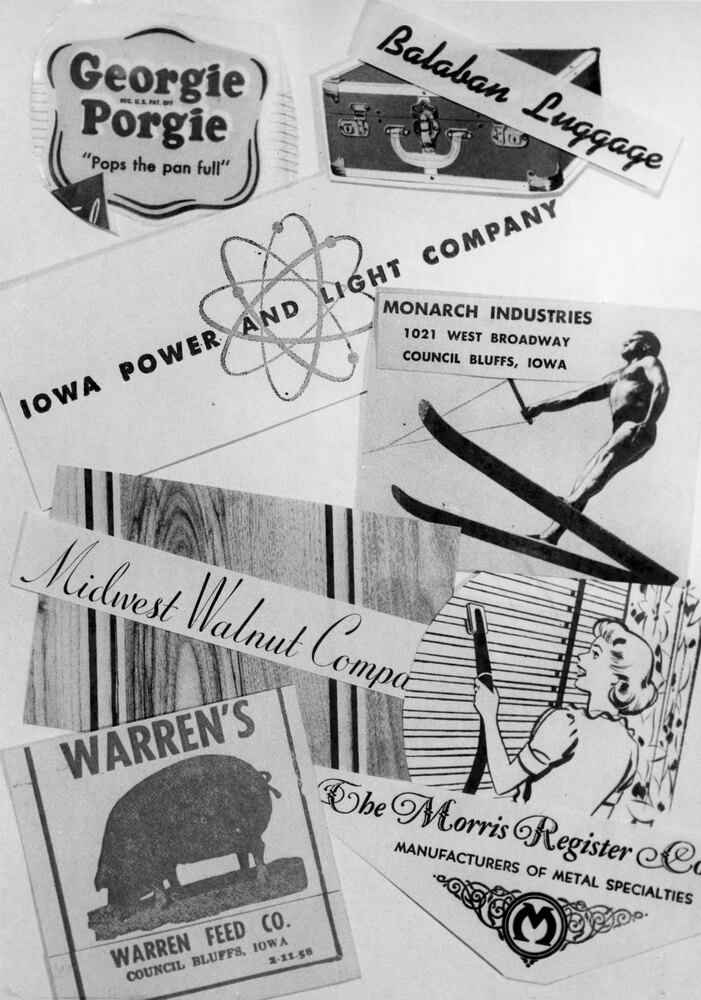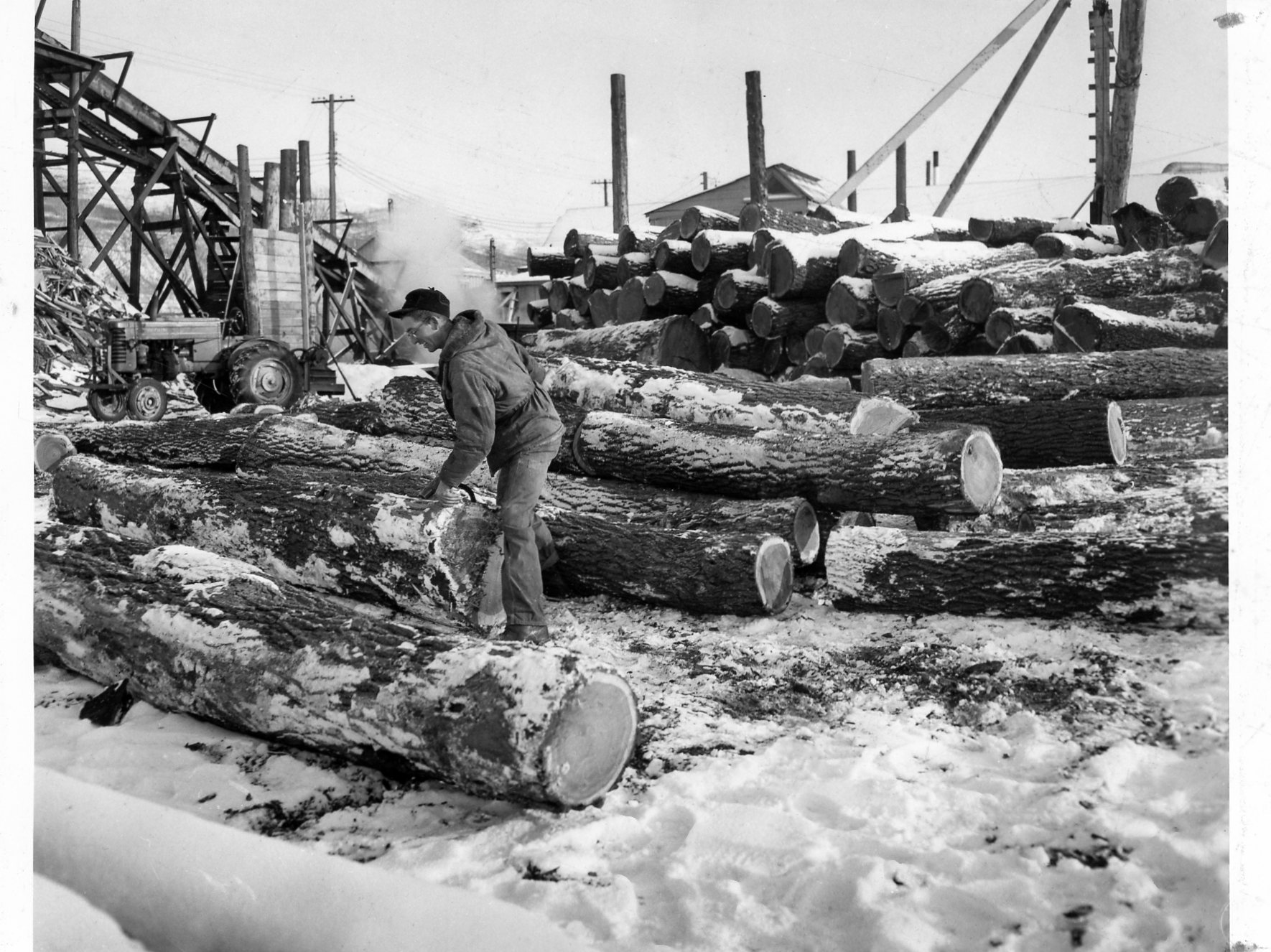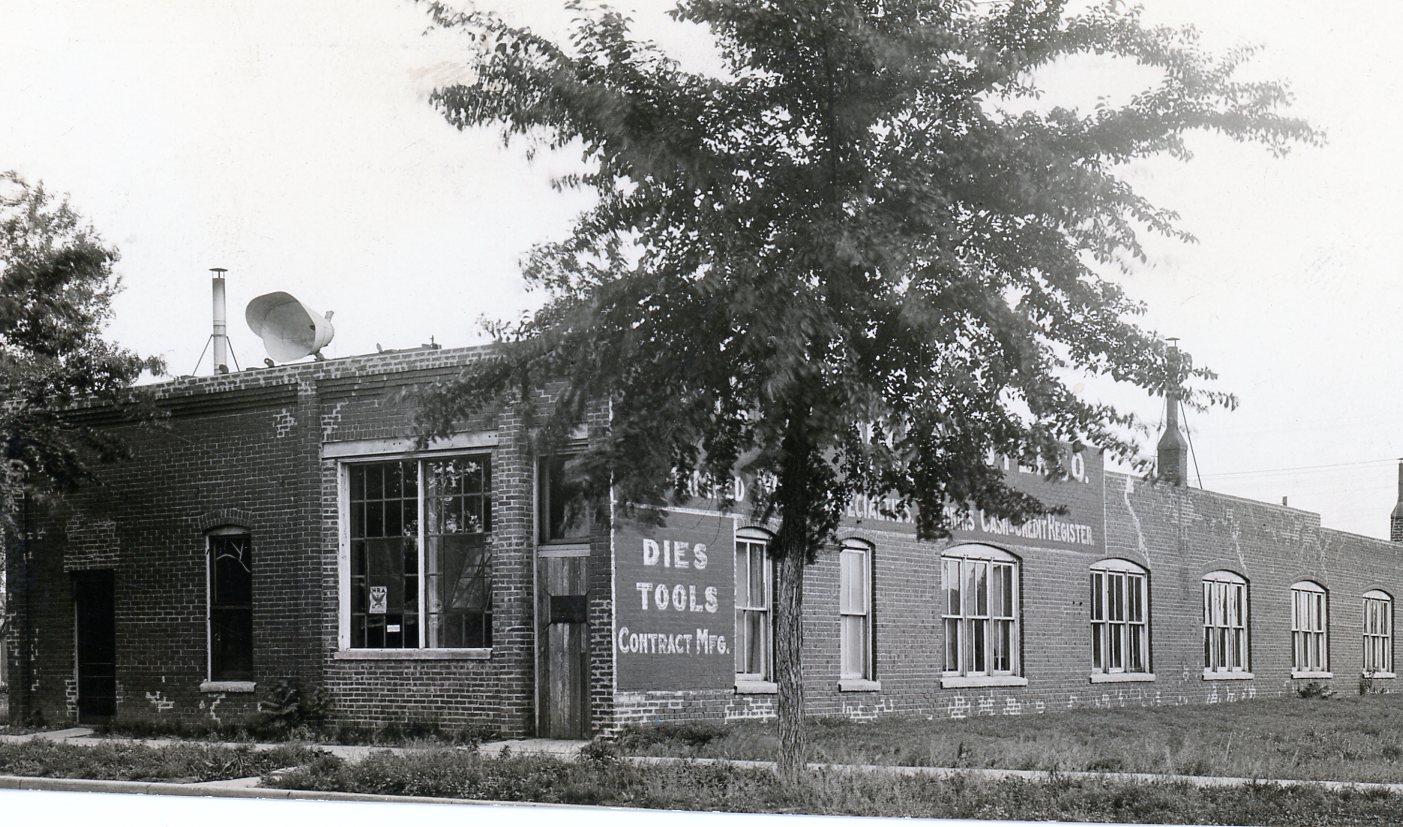
This is part five of a series focused on various company logos found in the August 21, 1958 issue of the Daily Nonpareil. A brief history of each business is included. The text from the original article read:
"Quiz a man about his home town, and he will surprise you with how little he knows-even of its most important assets. To any community a basic asset is its industry-the plants which provide paychecks for many of its citizens. And its products going out across the nation and the world are a city's most important ambassadors. Why do you know about Council Bluffs industry? The 37 insignia on this page represent a big share of the variety of products which might bear the label: 'Made in Council Bluffs.' How many do you recognize?"

Georgie Porgie was started in October of 1928 by R. D. Savage, George F. Hughes, and J. A. Williams. It was located “on the second and third floors of the Pennsylvania Consumers building,” located at 1102 South Main Street, according to an August 1928 issue of the Daily Nonpareil. The company focused on producing breakfast food, using newspaper and radio advertising to reach consumers. R. D. Savage’s son, Alfred, became the cowboy mascot featured on the Georgie Porgie cereal boxes when he was 5 years old. According to an interview with Alfred from the Omaha World Herald on July 9, 1981, his father “devised a live half-hour radio show starring [Alfred] and four or five” country singers. The show even traveled to different cities to be featured on regional radio stations. Savage also used a Stinson-Detroiter airplane for the Georgie Porgie Company. It was primarily “used by the company for advertising purposes and as a flying business office,” according to an April 10, 1931 Daily Nonpareil article. By 1934, the Nonpareil reported that Georgie Porgie was selling products all over the Midwest through “425 wholesale grocers and more than 25,000 retail stores.” The business went through legal and debt troubles that resulted in the company being sold to a new owner, R. F. Wiley, in 1940. Wiley continued producing breakfast products but also introduced popcorn as a product. He moved the facility to 29 South 21st Street in 1941. Eventually, George Porgie was sold to Carleton H. Woodward Jr. in 1957 and popcorn became the company’s main focus with all of the production, processing and packaging occurring at the facility. In 1971, Carleton Woodward announced that the business was closing after it was merged with the Hy-Pop Popcorn Company of Sac City, Iowa.

Balaban Luggage was started in 1917 by Benjamin Balaban. The business was located at 900 North 8th Street. Benjamin, his wife, and his son, Bernard, worked at the company along with about a dozen other employees to produce “suitcases, roller skate cases, small bags, foot lockers, and steamer trunks” according to a January 16, 1947 Daily Nonpareil article. In 1929, Benjamin opened a storefront at 746 West Broadway to sell his products and repair customer’s luggage. The company moved their storefront to 307 West Broadway in 1931 and later abandoned their retail footprint in 1933. Balaban Luggage produced about 26 different kinds of luggage and the company handled special orders too. Products would be covered in either metal or fiber depending on their applications. Bernard took over the family business after his father passed away in 1954. Bernard explained in a December 4, 1955 Daily Nonpareil article that “after World War II, the skate case business began to flourish and that line [of products] was added.” This prompted Bernard to focus more on this industry and sold his company’s products through “sellers of sporting goods [and] roller rink suppliers.” Bernard later closed Balaban Luggage in 1961.
Iowa Power and Light Company (IPLC) started providing electricity for Council Bluffs and southwest Iowa in 1949. Based out of Des Moines, IA, IPLC purchased the Western Iowa Power Company (WIPC), the previous utility company that supplied electricity to southwest Iowa. Frustrated with WIPC electricity rates, Council Bluffs citizens voted to allow IPLC to purchase WIPC and set up the IPLC Council Bluffs location as a franchise. Iowa Power and Light started by installing and replacing street lights in Council Bluffs. In addition, under their contract with the city, IPLC was required to erect a power plant near Council Bluffs. They chose a spot south of Lake Manawa and the power plant was completed in 1954. With coal as the main source of fuel along with some natural gas, the plant produced about 50,000 kW of electricity. When the power was first turned on at the facility, it was “the first time in history Council Bluffs became completely independent…of outside electrical power” according to a May 1, 1954 Daily Nonpareil article. “Omaha has provided power for this community since the beginning of the electrical era.” In 1958, the IPLC expanded the plant by adding a 90,000 kW generator, bringing the total operating capacity to 140,000 kW. In 1966, IPLC opened a work center at 3003 South 11th Street. This building allowed staff, materials, and vehicles to be centrally located in southwest Iowa. Citizens voted in favor of renewing the IPLC franchise in 1969 and construction of a 600,000 kW addition was planned for the early 1970s. Completed in 1978, the addition brought the total operating capacity to 740,000 kW. Despite the increased capacity, Council Bluffs citizens angrily contested proposed electricity rate increases, most notably in 1980. In certain cases, IPLC was charging customers increased rates that had not been approved by the Iowa Commerce Commission, the precursor to the Iowa Utilities Board. In 1990, IPLC was merged with Iowa Public Service Company to form Midwest Energy. In 1995, Midwest Energy and the Iowa-Illinois Gas and Electric Company merged to form the MidAmerican Energy Company. MidAmerican Energy continues to operate the Walter Scott Junior Energy Center power plant in Council Bluffs to this day.
Monarch Industries was owned by Richard E. Phillips and located at 917 South Main Street. The first mention of this business was in the 1935 city directory. Monarch Industries manufactured a range of products including oil and gas burning furnaces, heating and A/C equipment, peerless blowers, bleachers and floodlights. Phillips explained in a June 26, 1955 Daily Nonpareil article that he started his own manufacturing business in order to fabricate items he thought would be marketable. “We started with floodlights and are still making them, although many other products have come and gone in the meantime.” The company briefly moved to 207 South Main Street in the mid 1940s and in 1946, the company bought property at 1019 and 1021 West Broadway to expand their operations. The Daily Nonpareil reported in their December 16, 1946 issue that the buildings were renovated and became “an office and showroom, storage and packing rooms, and a metal fabrication shop” for the company. By the 1950s, floodlights became the main product of Monarch Industries and were used “for ballparks, schools, fairs, rodeos, and race tracks.” Richard’s son, Richard K. Phillips also came to work for the company around this time as well. The company continued operations until the late 1970s. It was last listed in the city directories in 1979.
Midwest Walnut Company began in 1931 when J. B. Petrus purchased the defunct Wood Mosaic Company lumber plant. Located at 1914 Tostevin Street, the business processed walnut trees that grew along the Missouri River into raw material for furniture, rifle stocks, coffins, and trim, to name a few. J. B. Petrus described the manufacturing process in a January 9, 1947 Daily Nonpareil article. Crews went out and cut the wood and brought it to the facility. It was then measured and sorted based on the quality of the wood and what it would be used for. Next, logs were debarked, sawn into boards, steamed to bring out the color in the wood, stacked, and dried in specialized kilns. By 1947, Midwest Walnut Company owned several sawmills across the midwest. J. B Petrus also made an effort to increase planting seeds to replenish the walnut trees in southwest Iowa. By the late 1950s, the business had become international. In addition to expanding the sales of the company, Petrus also took measures to control noise and smoke pollution at the facility. Soundproofing measures were put into place to reduce the noise from machinery and the company switched from burning their wood scraps to shredding and baling it for use in livestock bedding. In 1974, J. B. Petrus announced that Midwest Walnut was sold to Apache Corporation of Minneapolis, MN. It was indicated in an August 29, 1974 Daily Nonpareil article that “the name of the company will remain the same…[and] all personnel will remain the same.” Both he and his son, J. B. Petrus, Jr., retired from the company in 1978 and Jim Plowman was named the president of Midwest Walnut. Jim Plowman was interviewed on October 7, 1980 and mentioned that “about 25% of the firm’s production is exported to furniture manufacturers and gun shops in Europe and the Middle East.” He also mentioned that the main product at that time was gunstocks. By 1995, about half of their products were exported to foreign markets, particularly Japan, Taiwan, and Korea. Midwest Walnut Company continues to operate today at the same address.

The Morris Register Company opened in 1916 and manufactured Morris cash and credit registers from its location at 19 Pearl Street. The company briefly closed in 1923 and then was reorganized in 1924 with E. W. Dixon as the president. The company was moved to a new location at 2925 West Broadway where it had more space to produce many other items including floodlights, autographic recording machines, radio accessories, coil winding machines, gummed sealing tape, as well as the ability to perform metal stamping. In 1944, M. A. Murphy became president of the company. At this time, metal stamping was a large portion of the Morris Register Company’s business. In 1964, M. A. Murphy passed away and the company was temporarily closed for about one year. In 1965, MoReCo, Inc. purchased the Morris Register Company. MoReCo, Inc. used both the previous facilities for Morris Register Co. at 30th and West Broadway and its current facility at 109 South 28th Street. The company specialized in product engineering and development through metal stamping, welding, tube bending, hole punching, framing and tool making, according to a Daily Nonpareil article from April 26, 1970. MoReCo continued in Council Bluffs until about 1976. After this point it was no longer listed in the city directories.

Founded in 1944 by John Warren, Warren Feed Company provided farmers with feed for their livestock. The company was first located at 1230 South Main Street and then a year later it moved to 925 West Broadway. During the 1950s, the company started delivering feed directly to the farmers, restocking the feeders that dotted a farmer’s land. The complexity and ingredients of the supplements also changed. Warren noted in a Daily Nonpareil article from September 18, 1955, “where most feeds used to be made up of five items, there are now 20 to 30 ingredients in each kind.” He also mentioned that his company “rel[ies] 100 percent on research done at Iowa State College for our formulas” of their feeds. “Our business has changed from a simple mixing of basic ingredients to the point where we have to be druggists too” in regards to the different concentrations of vitamins and antibiotics found in the livestock feed. John Warren passed away in 1958 and his wife, Virginia, continued the business. Around 1960, the company was moved to 900 South 8th Street. In 1963, Warren Feed Company was purchased by Donald M. Beals. Virginia Warren became the office manager and her son, John Warren, managed the grain division of the new business. In addition to acquiring the old Drodge grain elevator at 9th Avenue and 10th Street, the Warren Feed Company also built additional grain elevators and silos for storage. The company automated several processes to increase efficiency and capacity at the facility in 1964. In 1975, the grain elevator at 9th Avenue and 10th Street was torn down. In 1976, a fire broke out at the business and the main office at 900 South 8th Street was nearly totally destroyed. The business did not recover and it was no longer listed in the city directories after 1976.
Sources:
Daily Nonpareil articles
Omaha World Herald articles
Des Moines Register articles